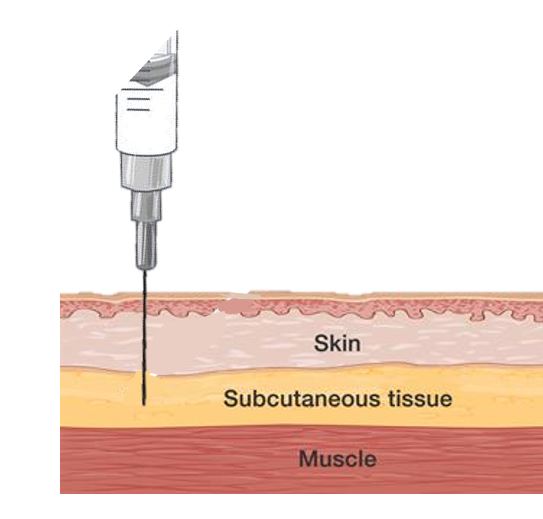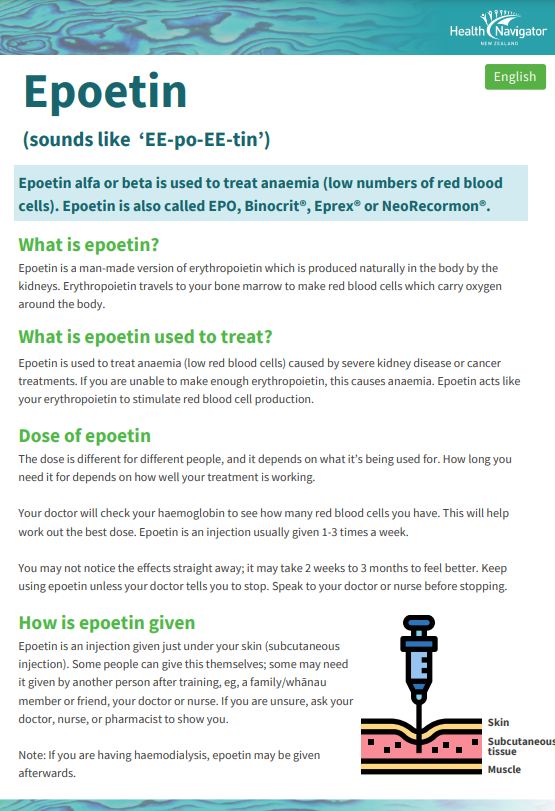The medication epoetin is a man-made version of human erythropoietin. Erythropoietin is produced naturally in the body, mostly by the kidneys. Erythropoietin travels from your kidneys to your bone marrow to make red blood cells. Red blood cells carry oxygen around the body.
We're aware of a problem when trying to use Zero Data to link to Healthify. Zero Data is managed by Health NZ and we are working with them to get this fixed.
Epoetin
Sounds like ‘EE-po-EE-tin.
Key points about epoetin
- Epoetin is used to treat anaemia (low numbers of red blood cells).
- Epoetin is also called Binocrit®.
- Find out how it is administered and possible side effects.

Some people can't make enough erythropoietin, which causes too few red blood cells (anaemia). Anaemia is common in people with kidney failure or those having chemotherapy for cancer treatment. Epoetin is used to treat anaemia from severe kidney disease or chemotherapy treatments. It acts like the natural substance in your body to stimulate red blood cell production.
Note: Epoetin isn't suitable for the treatment of anaemia from other causes, eg, iron or folate deficiency, or stomach bleeding.
In Aotearoa New Zealand, the funded brand of epoetin is called Binocrit.
The dose of the epoetin injection is different for different people, and it depends on what it’s being used for. How long you require epoetin injections for will depend on how well the treatment is working for you.
Your doctor will measure your haemoglobin level to work out the best dose of epoetin for you. Your doctor may adjust the dose depending on your haemoglobin levels. Epoetin is usually given 1 to 3 times a week.
You may not notice the effects of epoetin straight away. It may take 2 weeks or up to 3 months to feel better. You should continue to use epoetin unless you are advised by your doctor to stop. Talk to your doctor or nurse before stopping.
Epoetin is usually given as an injection just under your skin (this is called a subcutaneous injection).

Some people who are able to, and who have received training from a healthcare professional, can give themselves the injection. Otherwise it can be given by another person, eg, a family/whānau member or friend after proper training, or by your doctor or nurse. If you're unsure about how to inject epoetin or if you have any questions, always ask your doctor, nurse, or pharmacist to show you.
Note: If you are on haemodialysis, epoetin may be given after your dialysis sessions.
Preparation
Store epoetin in the fridge. It's best to bring the syringe up to room temperature before using it. You can take it out of the fridge 15 to 30 minutes before you use it, or warm it in your hands for about 1 minute. Don't warm it in the microwave or in hot water.
Injection site
Choose an injection site on the front of your thighs or your abdomen (belly) at least 5 cm from your belly button. The injection site should be different from your last injection site to prevent any bruising or thickening of the skin. Don't inject into a red or swollen area. Don't put the needle in too deep, it only needs to go under the skin.
Missed doses
If you miss a dose, inject it as soon as you remember. If you're within a day of your next injection, forget the missed one and carry on with your usual schedule. Don't take extra injections to make up for a forgotten dose.
Here are some things to know when you're taking epoetin. Other things may be important as well, so ask your healthcare provider what you should know about.
- Let your doctor or pharmacist know if you are allergic to latex.
- Iron supplements: For the epoetin injection to work well, you'll need enough iron in your body. Have a well-balanced including foods with iron (eg, meats, green vegetables, cereals and eggs). But if you have been given dietary information, please follow the advice of your dietitian. Some people may need to take iron tablets while receiving epoetin injections. Read more about iron and iron supplements.
- Syringe disposal: Do not recap the syringe because this can cause a needle stick injury. Dispose of syringes in a sharps bin. Ask your doctor, nurse or pharmacist about sharp bins if you don't have one.
- Taking other medicines and herbal supplements: Epoetin shouldn't be taken with some other medicines and herbal supplements. Tell your doctor or pharmacist about all medicines you are taking including over-the-counter medicines, herbal and complementary medicines or recreational drugs. Your doctor or pharmacist will be able to check for any interactions.
Like all medicines, epoetin can cause side effects, although not everyone gets them.
High blood pressure
Epoetin may cause high blood pressure (hypertension). Tell your doctor or nurse if you have ever had any problems with your blood pressure. You should also tell them if you take any medication for high blood pressure. Your nurse will check your blood pressure regularly during your treatment and you may be asked to monitor your blood pressure at home if you can.
Contact your doctor straight away if you:
- have a severe headache
- feel drowsy or confused
- have problems with your eyesight
- have fits (seizures)
- start being sick (vomiting).
These are signs that your blood pressure may be very high.
Other side effects
| Side effects | What should I do? |
|---|---|
|
|
|
|
|
|
|
|
| Read more about medicines and side effects and reporting a reaction you think might be a side effect. | |
The following links have more information on epoetin.
- Epoetin factsheet [PDF, 245 KB] Health Navigator NZ, 2022 English [PDF, 245 KB] Chinese (simplified) [PDF, 726 KB] Chinese (traditional) [PDF, 787 KB]
- Binocrit(external link) Medsafe Consumer Information Sheet
References
- Epoetin alfa(external link) New Zealand Formulary, NZ
Brochures

Medicines and side effects
Healthify He Puna Waiora, NZ, 2024

Health Quality and Safety Commission, NZ, 2019
Credits: Sandra Ponen, Pharmacist, Healthify He Puna Waiora. Healthify is brought to you by Health Navigator Charitable Trust.
Reviewed by: Angela Lambie, Pharmacist, Auckland
Last reviewed:
Page last updated:






